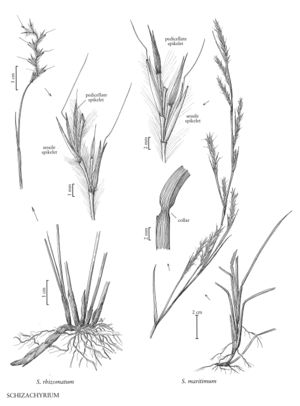Difference between revisions of "Schizachyrium rhizomatum"
FNA>Volume Importer |
FNA>Volume Importer |
||
| Line 7: | Line 7: | ||
|synonyms={{Treatment/ID/Synonym | |synonyms={{Treatment/ID/Synonym | ||
|name=Andropogon rhizomatous | |name=Andropogon rhizomatous | ||
| − | |authority= | + | |authority= |
| + | |rank=species | ||
}} | }} | ||
|hierarchy=Poaceae;Poaceae subfam. Panicoideae;Poaceae tribe Andropogoneae;Schizachyrium;Schizachyrium rhizomatum | |hierarchy=Poaceae;Poaceae subfam. Panicoideae;Poaceae tribe Andropogoneae;Schizachyrium;Schizachyrium rhizomatum | ||
| Line 20: | Line 21: | ||
-->{{Treatment/Body | -->{{Treatment/Body | ||
|distribution=Fla. | |distribution=Fla. | ||
| − | |discussion=<p>Schizachyrium rhizomatum grows in open glades and on the margins of pine woodlands and is endemic to Florida. It is restricted to thin, oolitic soils that are often saturated with water, and forms sparse stands, occasionally mixed with Andropogon gracilis, in the Florida Keys.</p> | + | |discussion=<p><i>Schizachyrium rhizomatum</i> grows in open glades and on the margins of pine woodlands and is endemic to Florida. It is restricted to thin, oolitic soils that are often saturated with water, and forms sparse stands, occasionally mixed with <i>Andropogon gracilis</i>, in the Florida Keys.</p> |
|tables= | |tables= | ||
|references= | |references= | ||
| Line 29: | Line 30: | ||
-->{{#Taxon: | -->{{#Taxon: | ||
name=Schizachyrium rhizomatum | name=Schizachyrium rhizomatum | ||
| − | |||
|authority=(Swallen) Gould | |authority=(Swallen) Gould | ||
|rank=species | |rank=species | ||
| Line 37: | Line 37: | ||
|family=Poaceae | |family=Poaceae | ||
|illustrator=Linda A. Vorobik | |illustrator=Linda A. Vorobik | ||
| + | |illustration copyright=Utah State University | ||
|distribution=Fla. | |distribution=Fla. | ||
|reference=None | |reference=None | ||
| Line 42: | Line 43: | ||
|publication year= | |publication year= | ||
|special status= | |special status= | ||
| − | |source xml=https:// | + | |source xml=https://jpend@bitbucket.org/aafc-mbb/fna-data-curation.git/src/f50eec43f223ca0e34566be0b046453a0960e173/coarse_grained_fna_xml/V25/V25_1615.xml |
|subfamily=Poaceae subfam. Panicoideae | |subfamily=Poaceae subfam. Panicoideae | ||
|tribe=Poaceae tribe Andropogoneae | |tribe=Poaceae tribe Andropogoneae | ||
Revision as of 20:35, 16 December 2019
Plants with short, scaly rhizomes. Culms 50-90 cm tall, usually less than 1 mm thick, not rooting or branching at the lower nodes, usually glabrous. Ligules about 0.5 mm; blades 9.5-25 cm long, 1-3 mm wide, usually folded, without a longitudinal stripe of white, spongy tissue. Peduncles 3-7 cm; rames 2-5.5 cm, with 5-14 spikelets, partially to fully exserted, collars neither elongate nor particularly narrow. Sessile spikelets 4-7.5 mm; calluses sparsely pubescent, hairs to 1.5 mm; awns 2.5-10 mm; upper lemmas membranous throughout, apices cleft for about 1/4 of their length. Pedicels 3.5-5 mm, ciliate, hairs to 2.3 mm, pedicel bases 0.1-0.2 mm wide, flaring above midlength to about 0.5 mm wide, tending to curve outward, rames appearing somewhat open. Pedicellate spikelets 2.5-5.5 mm, unawned or with awns to 1 mm.
Discussion
Schizachyrium rhizomatum grows in open glades and on the margins of pine woodlands and is endemic to Florida. It is restricted to thin, oolitic soils that are often saturated with water, and forms sparse stands, occasionally mixed with Andropogon gracilis, in the Florida Keys.
Selected References
None.
